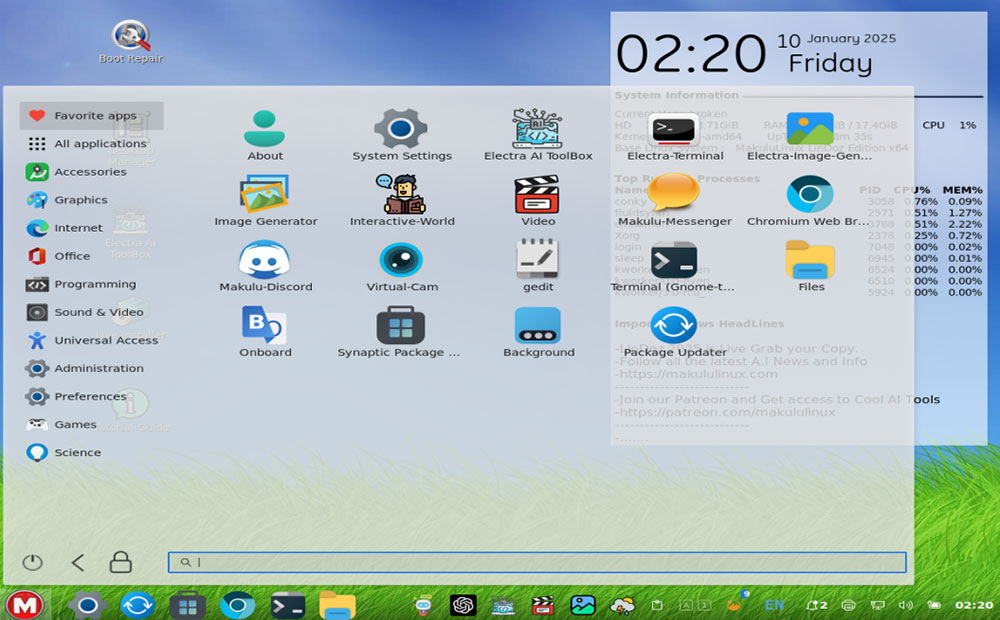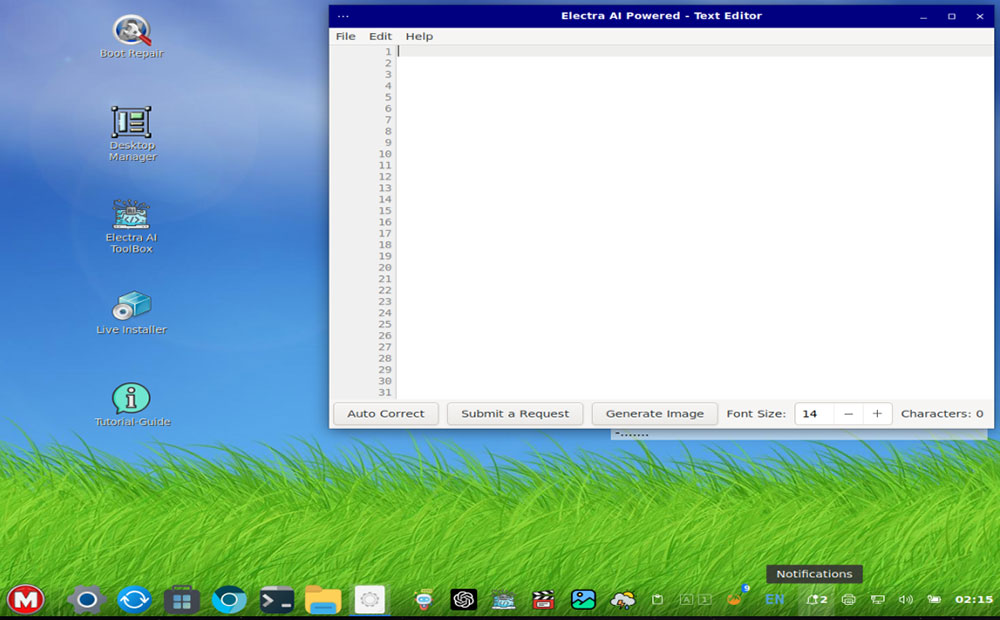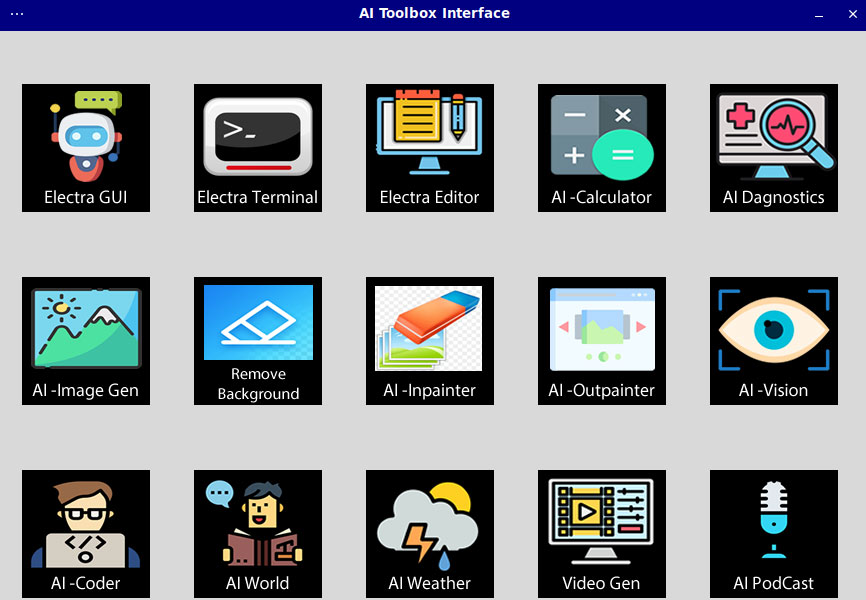The 2025 edition of MakuluLinux LinDoz stands out as one of the most innovative and user-friendly AI-powered Linux distributions to date. Built on a heavily customized Cinnamon desktop and based on the latest Debian testing release, it gives users free and unlimited access to an impressive AI toolkit.
While AI continues to infiltrate smartphones and desktop systems, it hasn’t yet gone fully mainstream on Linux. Most distros offer only modest integrations—like smarter system utilities, enhanced terminals, or minor experimental features. But developer Jacque Montague Raymer takes a far bolder approach with LinDoz.
Over the past three years, Raymer has worked to expand what’s possible on the Linux desktop by incorporating real AI capabilities for everyday users. His MakuluLinux project includes three primary editions—Max, LinDoz, and Shift—each with overlapping but unique features. LinDoz 2025 is the most ambitious yet, especially for those curious about AI in daily computing.
AI as a Core Feature, Not an Afterthought
Raymer’s work positions LinDoz 2025 as a direct alternative to ChatGPT-style platforms—but fully integrated into the Linux desktop. Even users who don’t usually like the Cinnamon desktop may appreciate the extensive customization options, which help soften the Windows-like feel while offering a unique visual experience.
Integrating advanced AI into a Linux distribution wasn’t easy. Raymer had to juggle open-source development, user privacy, and the challenge of building accessible tools for both casual and experienced users.
After ongoing frustrations with Ubuntu’s changing infrastructure, he shifted this release to Debian Linux, citing its increased driver support and more stable Python environment—key for his AI development work.
Maintaining Dual Code Bases Isn’t Easy
MakuluLinux maintains both Debian- and Ubuntu-based development tracks. Raymer explained the dilemma:
“We don’t know which one we’ll ship until a few months before release. One year, Ubuntu is more stable. The next, it’s Debian.”
Ubuntu’s constant Python updates disrupted his AI workflows, making development unpredictable. Debian, meanwhile, offered a smoother, more stable environment—and better support for rolling or semi-rolling releases.
Meet Electra: The Heart of LinDoz’s AI System

The real showstopper in LinDoz 2025 is Electra—an AI platform with a visual interface, personality, and a deeply integrated set of capabilities. Unlike other distros that rely on third-party AI plug-ins or subscriptions, Electra is custom-built, trained in-house, and runs on MakuluLinux’s own servers, bypassing services like OpenAI.
“Electra isn’t a single AI model,” said Raymer. “She’s a smart system that draws from a range of models depending on what the user needs—text, images, code, voice, translation, and more.”
These models are trained through a custom backend developed over two years using 27 connected servers. Electra intelligently routes tasks through different AI models optimized for everything from image generation to voice synthesis.
The result? A seamless, locally integrated AI experience, free for all LinDoz users.
Why LinDoz 2025 Stands Apart

Since its launch in 2019, MakuluLinux has built a reputation for delivering creative, forward-thinking Linux distributions. LinDoz, in particular, now leads the pack with its AI features and intuitive desktop.
Raymer’s unique tweaks to the Cinnamon environment go far beyond cosmetics. One example: the transparent bottom panel that dynamically changes when apps are full-screened. Other UI refinements, like pinned Conky widgets for system monitoring and calendars, give LinDoz a sleek yet functional look.
Popular features from other Makulu editions—like the Virtual Webcam tool—are even more advanced in LinDoz 2025, making it the most feature-rich release yet.
New AI Tools and Language Features

Among the standout updates introduced post-release is the Universal Language Translator, an AI-powered app that supports voice translation across dozens of languages. It’s ideal for users who need to chat or conduct business across language barriers.
The built-in messenger app leverages this functionality to deliver voice-driven real-time translation, letting users hear messages spoken in their native language—regardless of what the other person says.
LinDoz 2025 also addresses a key shortcoming of earlier releases: business productivity tools. Previously, users had to install their own office suites. Now, Raymer has integrated a customized version of Collabora Office (based on LibreOffice) that brings Electra’s AI features directly into the editor—from writing assistance to image generation inside documents.
Electra in Action
In demo videos shared by Raymer, Electra is shown composing music, generating code, translating languages, and creating complex documents—all through simple natural-language prompts. Whether you’re a developer, writer, or casual user, the experience is powerful and surprisingly intuitive.
Final Thoughts
While I typically prefer Ubuntu over Debian (fun fact: Ubuntu itself is Debian-based), the stability and performance of LinDoz 2025 on Debian are hard to ignore. I hope to see a future edition return to Ubuntu, but for now, this release is a major leap forward.

If you’re looking for a Linux distro that doesn’t just follow AI trends but actively pushes boundaries, MakuluLinux LinDoz 2025 is a must-try. With tools like ChatAI, an AI Therapist, Stock Market plugins, and even a new GameR edition featuring Android app support, this distro offers one of the most comprehensive AI experiences in the Linux world.
A KDE-based version is already in the works—so keep an eye on MakuluLinux as it continues redefining what a modern desktop OS can do.













Comments are closed